Case Study: Hair-Glo Pty Ltd and Legal Implications
VerifiedAdded on 2022/12/26
|7
|1983
|21
Case Study
AI Summary
This document presents a detailed legal case study concerning Hair-Glo Pty Ltd, examining issues related to company law, restraint of trade, and partnership law. The case involves David, who, after leaving Nu Shampoo Pty Ltd, established Hair-Glo Pty Ltd, potentially violating a non-compete clause. The analysis explores whether the corporate veil can be pierced to hold David liable, considering his role as a de facto director and the actions of his sister, Monica, who is the CEO. The study also analyzes a partnership scenario involving four friends, addressing the liability of the partnership for contracts made by individual partners, including contracts exceeding the agreed-upon financial limits, and contracts that are outside the scope of partnership. The analysis considers principles of agency, authority, and the rule of indoor management to determine the enforceability of these contracts. The assignment concludes with the application of relevant legal principles to the facts of the case and provides reasoned conclusions on the key legal issues.

Title page
Name of the student
Student ID
Name of the student
Student ID
Paraphrase This Document
Need a fresh take? Get an instant paraphrase of this document with our AI Paraphraser
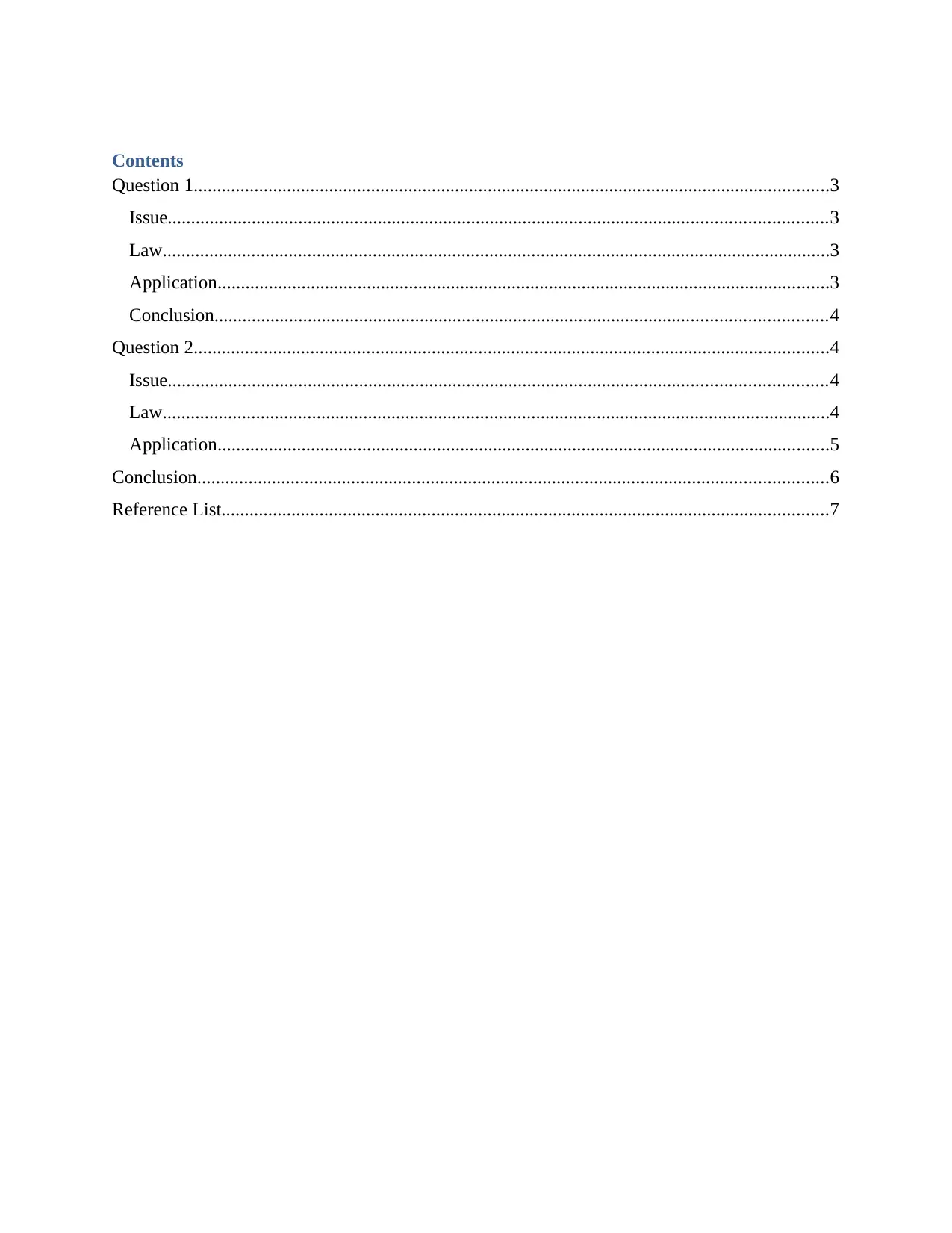
Contents
Question 1........................................................................................................................................3
Issue.............................................................................................................................................3
Law...............................................................................................................................................3
Application...................................................................................................................................3
Conclusion...................................................................................................................................4
Question 2........................................................................................................................................4
Issue.............................................................................................................................................4
Law...............................................................................................................................................4
Application...................................................................................................................................5
Conclusion.......................................................................................................................................6
Reference List..................................................................................................................................7
Question 1........................................................................................................................................3
Issue.............................................................................................................................................3
Law...............................................................................................................................................3
Application...................................................................................................................................3
Conclusion...................................................................................................................................4
Question 2........................................................................................................................................4
Issue.............................................................................................................................................4
Law...............................................................................................................................................4
Application...................................................................................................................................5
Conclusion.......................................................................................................................................6
Reference List..................................................................................................................................7
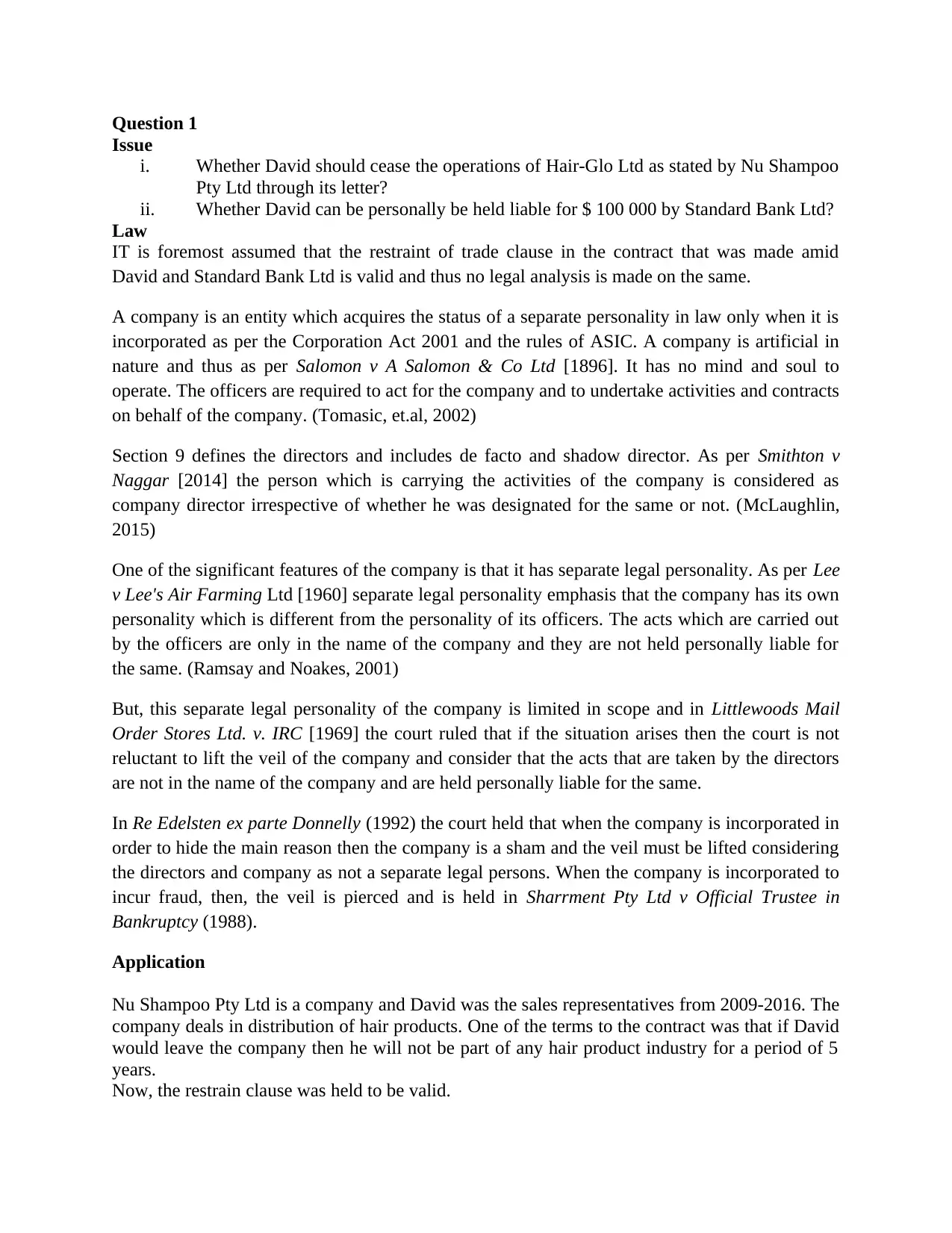
Question 1
Issue
i. Whether David should cease the operations of Hair-Glo Ltd as stated by Nu Shampoo
Pty Ltd through its letter?
ii. Whether David can be personally be held liable for $ 100 000 by Standard Bank Ltd?
Law
IT is foremost assumed that the restraint of trade clause in the contract that was made amid
David and Standard Bank Ltd is valid and thus no legal analysis is made on the same.
A company is an entity which acquires the status of a separate personality in law only when it is
incorporated as per the Corporation Act 2001 and the rules of ASIC. A company is artificial in
nature and thus as per Salomon v A Salomon & Co Ltd [1896]. It has no mind and soul to
operate. The officers are required to act for the company and to undertake activities and contracts
on behalf of the company. (Tomasic, et.al, 2002)
Section 9 defines the directors and includes de facto and shadow director. As per Smithton v
Naggar [2014] the person which is carrying the activities of the company is considered as
company director irrespective of whether he was designated for the same or not. (McLaughlin,
2015)
One of the significant features of the company is that it has separate legal personality. As per Lee
v Lee's Air Farming Ltd [1960] separate legal personality emphasis that the company has its own
personality which is different from the personality of its officers. The acts which are carried out
by the officers are only in the name of the company and they are not held personally liable for
the same. (Ramsay and Noakes, 2001)
But, this separate legal personality of the company is limited in scope and in Littlewoods Mail
Order Stores Ltd. v. IRC [1969] the court ruled that if the situation arises then the court is not
reluctant to lift the veil of the company and consider that the acts that are taken by the directors
are not in the name of the company and are held personally liable for the same.
In Re Edelsten ex parte Donnelly (1992) the court held that when the company is incorporated in
order to hide the main reason then the company is a sham and the veil must be lifted considering
the directors and company as not a separate legal persons. When the company is incorporated to
incur fraud, then, the veil is pierced and is held in Sharrment Pty Ltd v Official Trustee in
Bankruptcy (1988).
Application
Nu Shampoo Pty Ltd is a company and David was the sales representatives from 2009-2016. The
company deals in distribution of hair products. One of the terms to the contract was that if David
would leave the company then he will not be part of any hair product industry for a period of 5
years.
Now, the restrain clause was held to be valid.
Issue
i. Whether David should cease the operations of Hair-Glo Ltd as stated by Nu Shampoo
Pty Ltd through its letter?
ii. Whether David can be personally be held liable for $ 100 000 by Standard Bank Ltd?
Law
IT is foremost assumed that the restraint of trade clause in the contract that was made amid
David and Standard Bank Ltd is valid and thus no legal analysis is made on the same.
A company is an entity which acquires the status of a separate personality in law only when it is
incorporated as per the Corporation Act 2001 and the rules of ASIC. A company is artificial in
nature and thus as per Salomon v A Salomon & Co Ltd [1896]. It has no mind and soul to
operate. The officers are required to act for the company and to undertake activities and contracts
on behalf of the company. (Tomasic, et.al, 2002)
Section 9 defines the directors and includes de facto and shadow director. As per Smithton v
Naggar [2014] the person which is carrying the activities of the company is considered as
company director irrespective of whether he was designated for the same or not. (McLaughlin,
2015)
One of the significant features of the company is that it has separate legal personality. As per Lee
v Lee's Air Farming Ltd [1960] separate legal personality emphasis that the company has its own
personality which is different from the personality of its officers. The acts which are carried out
by the officers are only in the name of the company and they are not held personally liable for
the same. (Ramsay and Noakes, 2001)
But, this separate legal personality of the company is limited in scope and in Littlewoods Mail
Order Stores Ltd. v. IRC [1969] the court ruled that if the situation arises then the court is not
reluctant to lift the veil of the company and consider that the acts that are taken by the directors
are not in the name of the company and are held personally liable for the same.
In Re Edelsten ex parte Donnelly (1992) the court held that when the company is incorporated in
order to hide the main reason then the company is a sham and the veil must be lifted considering
the directors and company as not a separate legal persons. When the company is incorporated to
incur fraud, then, the veil is pierced and is held in Sharrment Pty Ltd v Official Trustee in
Bankruptcy (1988).
Application
Nu Shampoo Pty Ltd is a company and David was the sales representatives from 2009-2016. The
company deals in distribution of hair products. One of the terms to the contract was that if David
would leave the company then he will not be part of any hair product industry for a period of 5
years.
Now, the restrain clause was held to be valid.
⊘ This is a preview!⊘
Do you want full access?
Subscribe today to unlock all pages.

Trusted by 1+ million students worldwide
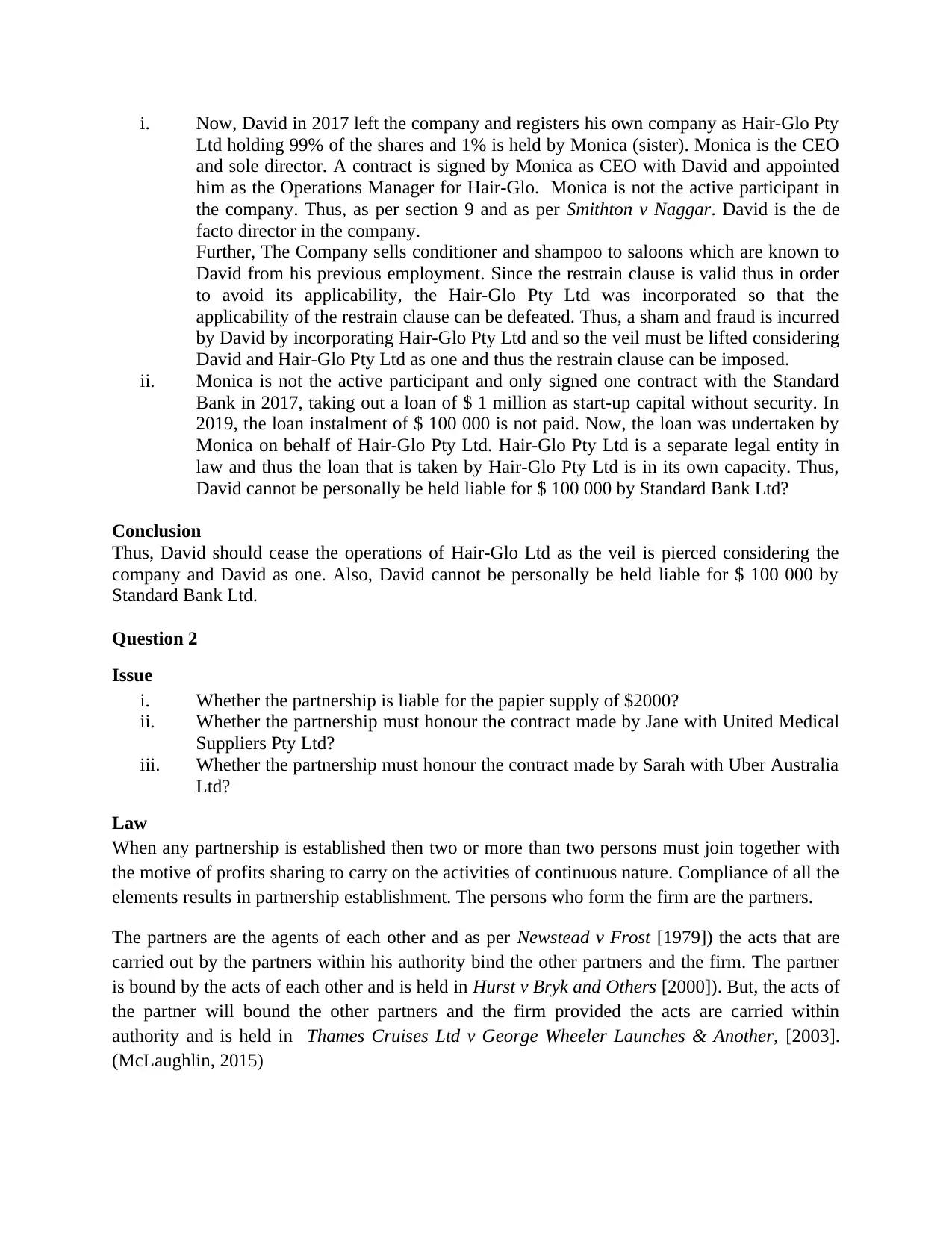
i. Now, David in 2017 left the company and registers his own company as Hair-Glo Pty
Ltd holding 99% of the shares and 1% is held by Monica (sister). Monica is the CEO
and sole director. A contract is signed by Monica as CEO with David and appointed
him as the Operations Manager for Hair-Glo. Monica is not the active participant in
the company. Thus, as per section 9 and as per Smithton v Naggar. David is the de
facto director in the company.
Further, The Company sells conditioner and shampoo to saloons which are known to
David from his previous employment. Since the restrain clause is valid thus in order
to avoid its applicability, the Hair-Glo Pty Ltd was incorporated so that the
applicability of the restrain clause can be defeated. Thus, a sham and fraud is incurred
by David by incorporating Hair-Glo Pty Ltd and so the veil must be lifted considering
David and Hair-Glo Pty Ltd as one and thus the restrain clause can be imposed.
ii. Monica is not the active participant and only signed one contract with the Standard
Bank in 2017, taking out a loan of $ 1 million as start-up capital without security. In
2019, the loan instalment of $ 100 000 is not paid. Now, the loan was undertaken by
Monica on behalf of Hair-Glo Pty Ltd. Hair-Glo Pty Ltd is a separate legal entity in
law and thus the loan that is taken by Hair-Glo Pty Ltd is in its own capacity. Thus,
David cannot be personally be held liable for $ 100 000 by Standard Bank Ltd?
Conclusion
Thus, David should cease the operations of Hair-Glo Ltd as the veil is pierced considering the
company and David as one. Also, David cannot be personally be held liable for $ 100 000 by
Standard Bank Ltd.
Question 2
Issue
i. Whether the partnership is liable for the papier supply of $2000?
ii. Whether the partnership must honour the contract made by Jane with United Medical
Suppliers Pty Ltd?
iii. Whether the partnership must honour the contract made by Sarah with Uber Australia
Ltd?
Law
When any partnership is established then two or more than two persons must join together with
the motive of profits sharing to carry on the activities of continuous nature. Compliance of all the
elements results in partnership establishment. The persons who form the firm are the partners.
The partners are the agents of each other and as per Newstead v Frost [1979]) the acts that are
carried out by the partners within his authority bind the other partners and the firm. The partner
is bound by the acts of each other and is held in Hurst v Bryk and Others [2000]). But, the acts of
the partner will bound the other partners and the firm provided the acts are carried within
authority and is held in Thames Cruises Ltd v George Wheeler Launches & Another, [2003].
(McLaughlin, 2015)
Ltd holding 99% of the shares and 1% is held by Monica (sister). Monica is the CEO
and sole director. A contract is signed by Monica as CEO with David and appointed
him as the Operations Manager for Hair-Glo. Monica is not the active participant in
the company. Thus, as per section 9 and as per Smithton v Naggar. David is the de
facto director in the company.
Further, The Company sells conditioner and shampoo to saloons which are known to
David from his previous employment. Since the restrain clause is valid thus in order
to avoid its applicability, the Hair-Glo Pty Ltd was incorporated so that the
applicability of the restrain clause can be defeated. Thus, a sham and fraud is incurred
by David by incorporating Hair-Glo Pty Ltd and so the veil must be lifted considering
David and Hair-Glo Pty Ltd as one and thus the restrain clause can be imposed.
ii. Monica is not the active participant and only signed one contract with the Standard
Bank in 2017, taking out a loan of $ 1 million as start-up capital without security. In
2019, the loan instalment of $ 100 000 is not paid. Now, the loan was undertaken by
Monica on behalf of Hair-Glo Pty Ltd. Hair-Glo Pty Ltd is a separate legal entity in
law and thus the loan that is taken by Hair-Glo Pty Ltd is in its own capacity. Thus,
David cannot be personally be held liable for $ 100 000 by Standard Bank Ltd?
Conclusion
Thus, David should cease the operations of Hair-Glo Ltd as the veil is pierced considering the
company and David as one. Also, David cannot be personally be held liable for $ 100 000 by
Standard Bank Ltd.
Question 2
Issue
i. Whether the partnership is liable for the papier supply of $2000?
ii. Whether the partnership must honour the contract made by Jane with United Medical
Suppliers Pty Ltd?
iii. Whether the partnership must honour the contract made by Sarah with Uber Australia
Ltd?
Law
When any partnership is established then two or more than two persons must join together with
the motive of profits sharing to carry on the activities of continuous nature. Compliance of all the
elements results in partnership establishment. The persons who form the firm are the partners.
The partners are the agents of each other and as per Newstead v Frost [1979]) the acts that are
carried out by the partners within his authority bind the other partners and the firm. The partner
is bound by the acts of each other and is held in Hurst v Bryk and Others [2000]). But, the acts of
the partner will bound the other partners and the firm provided the acts are carried within
authority and is held in Thames Cruises Ltd v George Wheeler Launches & Another, [2003].
(McLaughlin, 2015)
Paraphrase This Document
Need a fresh take? Get an instant paraphrase of this document with our AI Paraphraser
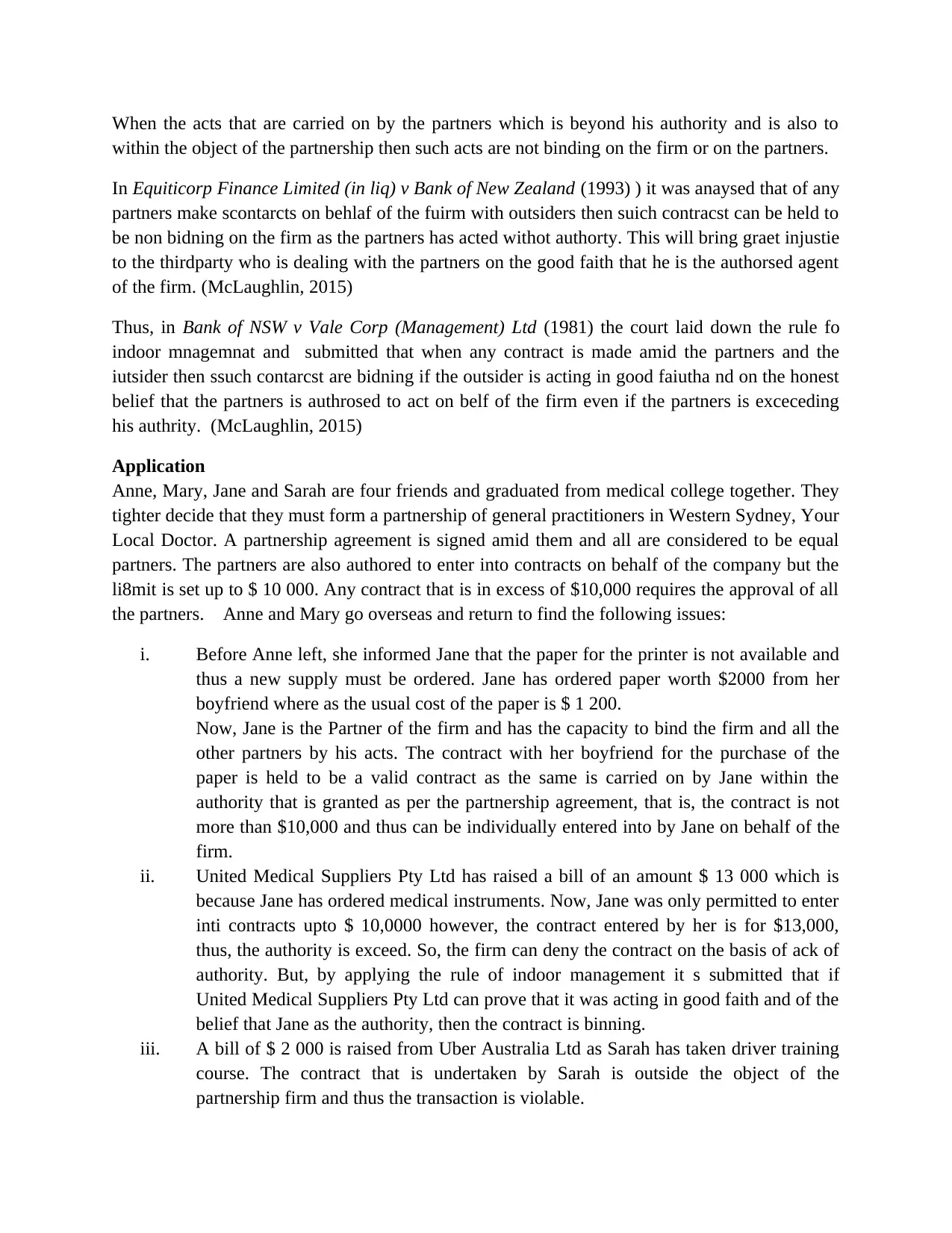
When the acts that are carried on by the partners which is beyond his authority and is also to
within the object of the partnership then such acts are not binding on the firm or on the partners.
In Equiticorp Finance Limited (in liq) v Bank of New Zealand (1993) ) it was anaysed that of any
partners make scontarcts on behlaf of the fuirm with outsiders then suich contracst can be held to
be non bidning on the firm as the partners has acted withot authorty. This will bring graet injustie
to the thirdparty who is dealing with the partners on the good faith that he is the authorsed agent
of the firm. (McLaughlin, 2015)
Thus, in Bank of NSW v Vale Corp (Management) Ltd (1981) the court laid down the rule fo
indoor mnagemnat and submitted that when any contract is made amid the partners and the
iutsider then ssuch contarcst are bidning if the outsider is acting in good faiutha nd on the honest
belief that the partners is authrosed to act on belf of the firm even if the partners is exceceding
his authrity. (McLaughlin, 2015)
Application
Anne, Mary, Jane and Sarah are four friends and graduated from medical college together. They
tighter decide that they must form a partnership of general practitioners in Western Sydney, Your
Local Doctor. A partnership agreement is signed amid them and all are considered to be equal
partners. The partners are also authored to enter into contracts on behalf of the company but the
li8mit is set up to $ 10 000. Any contract that is in excess of $10,000 requires the approval of all
the partners. Anne and Mary go overseas and return to find the following issues:
i. Before Anne left, she informed Jane that the paper for the printer is not available and
thus a new supply must be ordered. Jane has ordered paper worth $2000 from her
boyfriend where as the usual cost of the paper is $ 1 200.
Now, Jane is the Partner of the firm and has the capacity to bind the firm and all the
other partners by his acts. The contract with her boyfriend for the purchase of the
paper is held to be a valid contract as the same is carried on by Jane within the
authority that is granted as per the partnership agreement, that is, the contract is not
more than $10,000 and thus can be individually entered into by Jane on behalf of the
firm.
ii. United Medical Suppliers Pty Ltd has raised a bill of an amount $ 13 000 which is
because Jane has ordered medical instruments. Now, Jane was only permitted to enter
inti contracts upto $ 10,0000 however, the contract entered by her is for $13,000,
thus, the authority is exceed. So, the firm can deny the contract on the basis of ack of
authority. But, by applying the rule of indoor management it s submitted that if
United Medical Suppliers Pty Ltd can prove that it was acting in good faith and of the
belief that Jane as the authority, then the contract is binning.
iii. A bill of $ 2 000 is raised from Uber Australia Ltd as Sarah has taken driver training
course. The contract that is undertaken by Sarah is outside the object of the
partnership firm and thus the transaction is violable.
within the object of the partnership then such acts are not binding on the firm or on the partners.
In Equiticorp Finance Limited (in liq) v Bank of New Zealand (1993) ) it was anaysed that of any
partners make scontarcts on behlaf of the fuirm with outsiders then suich contracst can be held to
be non bidning on the firm as the partners has acted withot authorty. This will bring graet injustie
to the thirdparty who is dealing with the partners on the good faith that he is the authorsed agent
of the firm. (McLaughlin, 2015)
Thus, in Bank of NSW v Vale Corp (Management) Ltd (1981) the court laid down the rule fo
indoor mnagemnat and submitted that when any contract is made amid the partners and the
iutsider then ssuch contarcst are bidning if the outsider is acting in good faiutha nd on the honest
belief that the partners is authrosed to act on belf of the firm even if the partners is exceceding
his authrity. (McLaughlin, 2015)
Application
Anne, Mary, Jane and Sarah are four friends and graduated from medical college together. They
tighter decide that they must form a partnership of general practitioners in Western Sydney, Your
Local Doctor. A partnership agreement is signed amid them and all are considered to be equal
partners. The partners are also authored to enter into contracts on behalf of the company but the
li8mit is set up to $ 10 000. Any contract that is in excess of $10,000 requires the approval of all
the partners. Anne and Mary go overseas and return to find the following issues:
i. Before Anne left, she informed Jane that the paper for the printer is not available and
thus a new supply must be ordered. Jane has ordered paper worth $2000 from her
boyfriend where as the usual cost of the paper is $ 1 200.
Now, Jane is the Partner of the firm and has the capacity to bind the firm and all the
other partners by his acts. The contract with her boyfriend for the purchase of the
paper is held to be a valid contract as the same is carried on by Jane within the
authority that is granted as per the partnership agreement, that is, the contract is not
more than $10,000 and thus can be individually entered into by Jane on behalf of the
firm.
ii. United Medical Suppliers Pty Ltd has raised a bill of an amount $ 13 000 which is
because Jane has ordered medical instruments. Now, Jane was only permitted to enter
inti contracts upto $ 10,0000 however, the contract entered by her is for $13,000,
thus, the authority is exceed. So, the firm can deny the contract on the basis of ack of
authority. But, by applying the rule of indoor management it s submitted that if
United Medical Suppliers Pty Ltd can prove that it was acting in good faith and of the
belief that Jane as the authority, then the contract is binning.
iii. A bill of $ 2 000 is raised from Uber Australia Ltd as Sarah has taken driver training
course. The contract that is undertaken by Sarah is outside the object of the
partnership firm and thus the transaction is violable.

Conclusion
Thus, the contracts that are made by Jane are binding but the contract made by sarah is not
binding.
Thus, the contracts that are made by Jane are binding but the contract made by sarah is not
binding.
⊘ This is a preview!⊘
Do you want full access?
Subscribe today to unlock all pages.

Trusted by 1+ million students worldwide
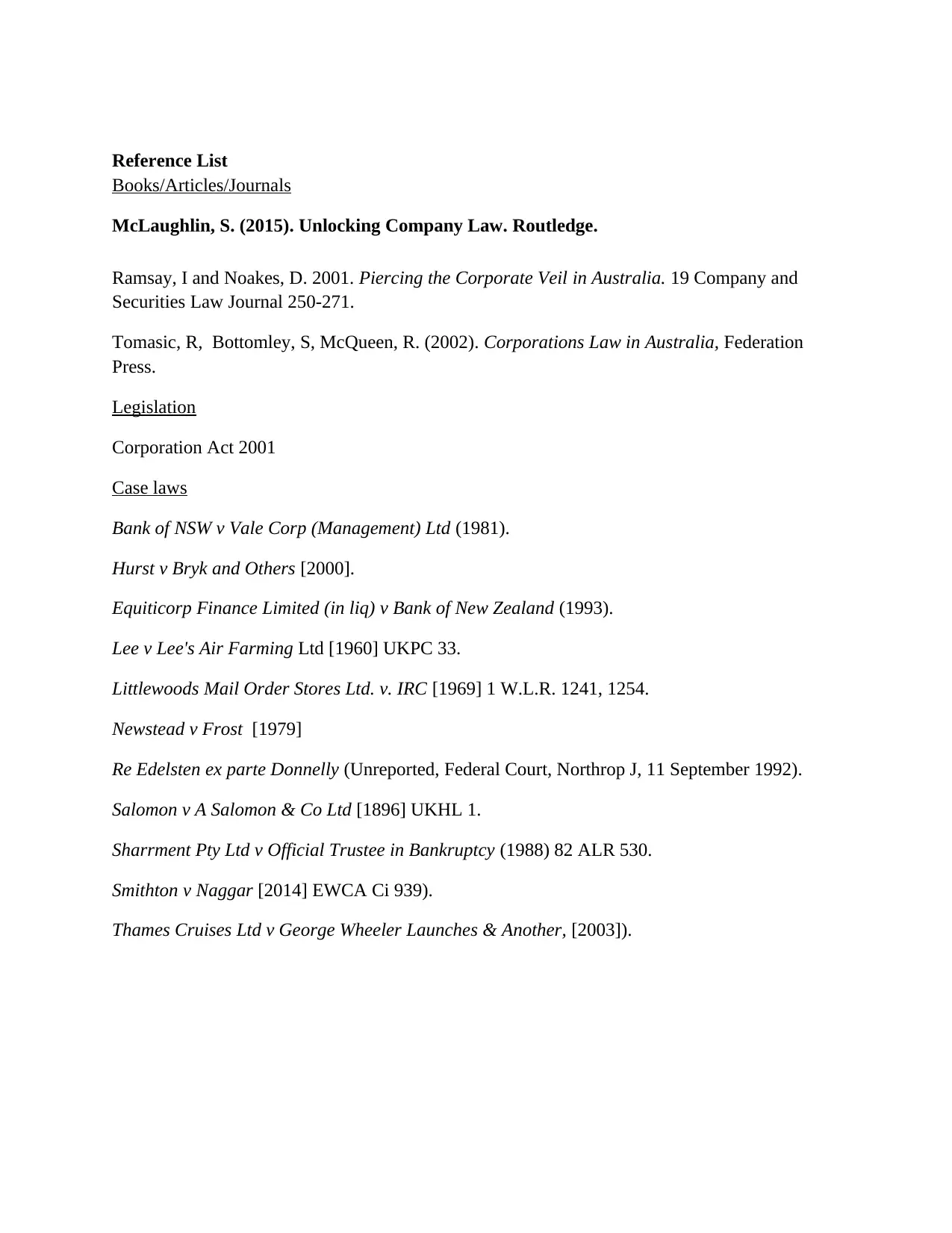
Reference List
Books/Articles/Journals
McLaughlin, S. (2015). Unlocking Company Law. Routledge.
Ramsay, I and Noakes, D. 2001. Piercing the Corporate Veil in Australia. 19 Company and
Securities Law Journal 250-271.
Tomasic, R, Bottomley, S, McQueen, R. (2002). Corporations Law in Australia, Federation
Press.
Legislation
Corporation Act 2001
Case laws
Bank of NSW v Vale Corp (Management) Ltd (1981).
Hurst v Bryk and Others [2000].
Equiticorp Finance Limited (in liq) v Bank of New Zealand (1993).
Lee v Lee's Air Farming Ltd [1960] UKPC 33.
Littlewoods Mail Order Stores Ltd. v. IRC [1969] 1 W.L.R. 1241, 1254.
Newstead v Frost [1979]
Re Edelsten ex parte Donnelly (Unreported, Federal Court, Northrop J, 11 September 1992).
Salomon v A Salomon & Co Ltd [1896] UKHL 1.
Sharrment Pty Ltd v Official Trustee in Bankruptcy (1988) 82 ALR 530.
Smithton v Naggar [2014] EWCA Ci 939).
Thames Cruises Ltd v George Wheeler Launches & Another, [2003]).
Books/Articles/Journals
McLaughlin, S. (2015). Unlocking Company Law. Routledge.
Ramsay, I and Noakes, D. 2001. Piercing the Corporate Veil in Australia. 19 Company and
Securities Law Journal 250-271.
Tomasic, R, Bottomley, S, McQueen, R. (2002). Corporations Law in Australia, Federation
Press.
Legislation
Corporation Act 2001
Case laws
Bank of NSW v Vale Corp (Management) Ltd (1981).
Hurst v Bryk and Others [2000].
Equiticorp Finance Limited (in liq) v Bank of New Zealand (1993).
Lee v Lee's Air Farming Ltd [1960] UKPC 33.
Littlewoods Mail Order Stores Ltd. v. IRC [1969] 1 W.L.R. 1241, 1254.
Newstead v Frost [1979]
Re Edelsten ex parte Donnelly (Unreported, Federal Court, Northrop J, 11 September 1992).
Salomon v A Salomon & Co Ltd [1896] UKHL 1.
Sharrment Pty Ltd v Official Trustee in Bankruptcy (1988) 82 ALR 530.
Smithton v Naggar [2014] EWCA Ci 939).
Thames Cruises Ltd v George Wheeler Launches & Another, [2003]).
1 out of 7
Related Documents
Your All-in-One AI-Powered Toolkit for Academic Success.
+13062052269
info@desklib.com
Available 24*7 on WhatsApp / Email
![[object Object]](/_next/static/media/star-bottom.7253800d.svg)
Unlock your academic potential
Copyright © 2020–2026 A2Z Services. All Rights Reserved. Developed and managed by ZUCOL.





